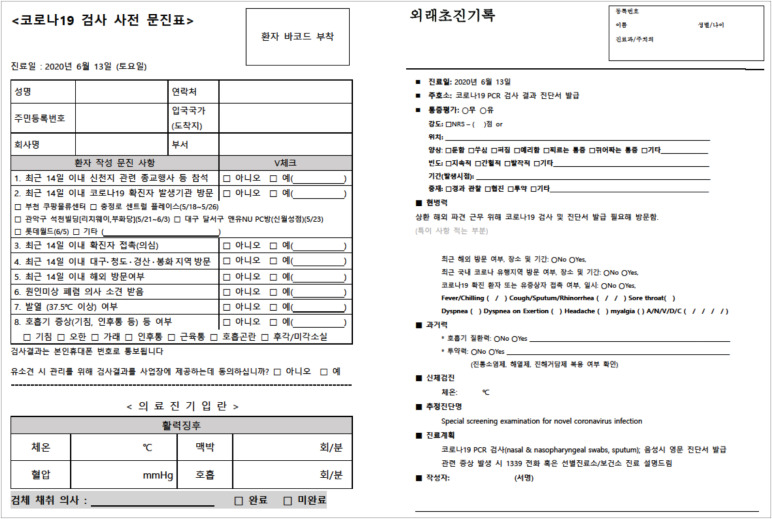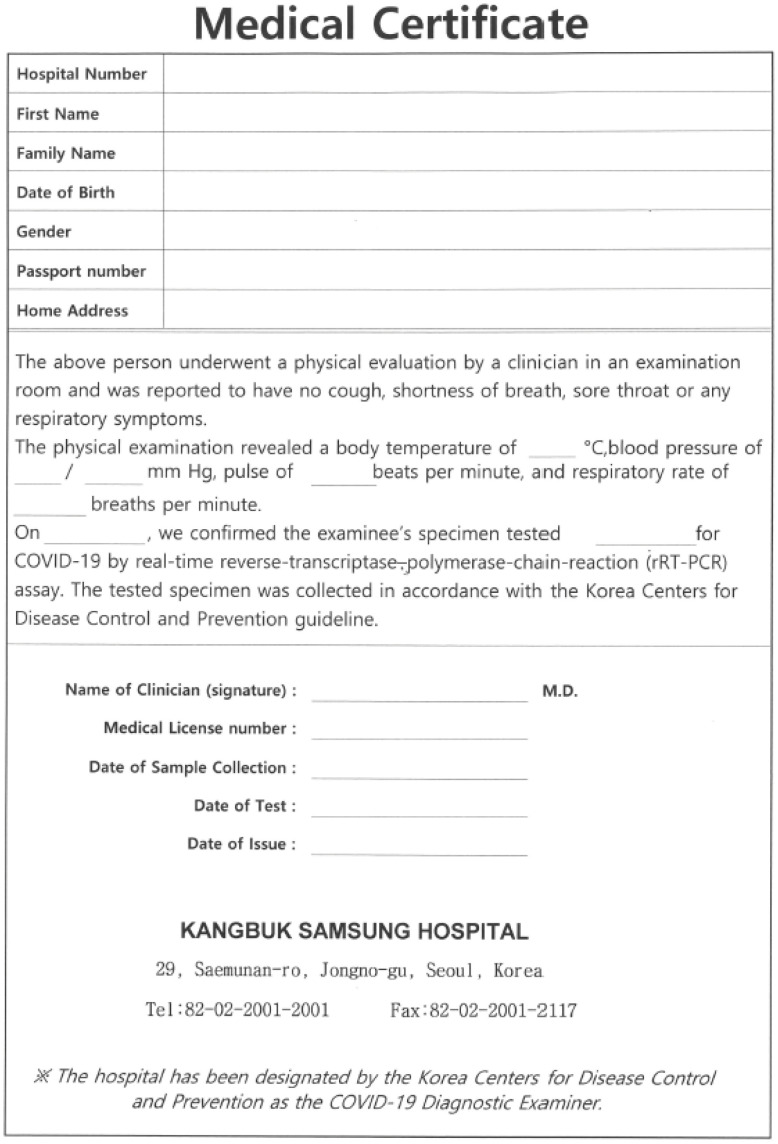Abstract
The ongoing coronavirus disease 2019 (COVID-19) pandemic is causing tremendous damage globally. The Republic of Korea (ROK), a highly export-dependent nation, is a leader in the fight against the COVID-19 pandemic and coping well with the disaster. Like the drive-through COVID-19 testing, which reflects the brilliant flexibility of the Korean medical system, onsite mass workplace testing for COVID-19, which our hospital has been performing over the past few months, is a unique and valuable countermeasure. We believe it is time that the current health examination system for workers in the ROK considered the risk of transmissible diseases.
-
Keywords: COVID-19; Workplace; Mass testing; Physical examination
The ongoing coronavirus disease 2019 (COVID-19) pandemic has caused disastrous damage worldwide. The severe acute respiratory syndrome coronavirus 2 (SARS-CoV-2), which causes COVID-19, is a zoonotic ribonucleic acid (RNA) virus that mainly infects the human pulmonary system and is primarily transmitted between people via droplets. Since the first report of a local outbreak in Wuhan, China, COVID-19 has claimed many lives, while forcing many people out of jobs in just a few months [
1]. Global trade has suffered considerably, and the Republic of Korea (ROK), one of the most export-dependent countries in the world, received a severe blow to its economy. The Organization for Economic Cooperation and Development (OECD) estimates that the global economic growth rate in 2020 will be −6.0%, but what is to be noted is that this figure is based on the premise that there would be no subsequent waves of COVID-19 [
2].
Notwithstanding the damage, the ROK is thought to be a leader in the fight against the COVID-19 pandemic, with the incidence and fatality rate of COVID-19 in the ROK, as of June 11, 2020, being 23.04 per 100,000 and 2.3%, respectively [
3]. These relatively low figures compared with other nations show that the ROK has responded well to the COVID-19 pandemic. As a result, the OECD estimates that the economic growth rate of the ROK will be −1.2% this year, the highest among the nations of the Group of 20 (G20) [
2]. One of the secrets to the ROK's successful response is its COVID-19 testing capability driven by the availability of fast and precise diagnostic tools that are made in the ROK, along with the low costs of testing and excellent medical infrastructure. The drive-through COVID-19 testing is a brilliant application of the drive-through and pick-up model of the food industry to medical examinations, which is characteristic of the so-called “K-epidemic response.”
As many countries shut down their borders to control the inflow of infected people, multinational corporations faced management challenges. They could not move their employees from one country to another, especially from their headquarters to foreign branches. Solving this problem was a top priority for a nation like the ROK due to its high economic dependency on trade. The Korean government and domestic corporations pursued diplomatic solutions. They came up with an idea to convince their major trade partners. They assured them that their employees would be tested for COVID-19 and only personnel certified as healthy would be sent.
For this purpose, we have implemented COVID-19 testing for workers who need the certification. However, our hospital, like all others in the ROK, is overcrowded with patients, raising the risk of hospital-based transmissions. To curb the chances of infection, we visit workers in their workplaces and test them onsite. All workers are examined by physicians and asked about symptoms, disease history, and, most importantly, COVID-19 exposure risks (
Fig. 1). Sample collections for COVID-19 laboratory tests are done by physicians in a separate facility outside the main building complexes because of concerns about droplet or aerosol generation.
As of June 11, 2020, 2,620 workers had been tested with reverse transcription polymerase chain reaction (RT-PCR), and none of them was found to be positive (
Table 1). We have issued certifications for overseas dispatches, enabling workers to perform their tasks abroad without unnecessary quarantine periods (
Fig. 2).
Due to the unprecedented COVID-19 pandemic, regular health examinations for workers in the ROK have been pending for several months. We were able to resume the scheduled examinations recently as the spread of COVID-19 in the ROK has slowed. However, many things have changed: all examinees are now required to wear masks, temperature checking is mandatory, and pulmonary function tests are prohibited. Even with these precautionary measures, there is no guarantee that we can retain our system.
The most important reason for this uncertainty is that the current system does not consider the effects of transmissible disease outbreaks on the regular health examination system of Korean workers. Alongside onsite COVID-19 examinations, we believe the following issues must be discussed further.
First, regular health examinations of employees are usually conducted for a large number of workers at the same time. This poses an inherent risk of transmission of infectious diseases. We need to individualize the present process in a more effective manner.
Second, the current examination system neglects biohazards, and there are no regulations on what should be done under routine conditions and what should be done under extraordinary circumstances that involve infection risks. The regulations need to be amended to prepare for possible future outbreaks of communicable diseases.
Third, we need to focus on the fact that onsite COVID-19 testing can serve as job fitness evaluations. Workers found to be COVID-19 negative could get a certification to work overseas, which means he or she is healthy and fit for the job. As decisions about the job fitness of candidates are made based on their regular health examinations in relation to occupational hazards, we believe the same concept can be applied to COVID-19 tests. There is social and clinical evidence on the benefits of adding testing for infectious diseases like COVID-19 to the current system.
In addition, the fact that the Korean Medical Service Act prevents physicians from practicing outside approved areas, such as hospitals, should be borne in mind [
4]. In fact, the legal grounds for onsite COVID-19 testing is weak, although the Korean Medical Service Act allows physicians to practice outside hospitals when it is officially sanctioned by authorities in public interest, which could be the case with the current regular health examination system for workers. We reported our onsite COVID-19 examinations to local authorities and gained approval, but it was temporary. If we are to promote onsite COVID-19 tests for the public good, we believe that we must include it in the current system.
To the best of our knowledge, onsite mass workplace testing for COVID-19 is not practiced elsewhere. Its social benefits are indisputable. To overcome these challenging times, we should promote what we do best and incorporate testing for COVID-19 in the system as quickly and widely as possible. In addition, we need to improve the present health examination system for workers to cope with infectious diseases more efficiently.
Abbreviations
Organization for Economic Cooperation and Development
polymerase chain reaction
reverse transcription polymerase chain reaction
severe acute respiratory syndrome coronavirus 2
NOTES
-
Competing interests: The authors declare that they have no competing interests.
-
Author Contributions:
Conceptualization: Lee C.
Investigation: Seo E, Mun E.
Writing - original draft: Seo E, Lee C.
Writing - review & editing: Kim W.
REFERENCES
REFERENCES
Table 1RT-PCR test results of workers tested for COVID-19
|
RT-PCR |
Results |
|
Positive |
0 |
|
Negative |
2,620 |
Fig. 1
Health questionnaires for COVID-19 examination.
COVID-19: coronavirus disease 2019; PCR: polymerase chain reaction.

Fig. 2
Health certificate for COVID-19 examination.
COVID-19: coronavirus disease 2019.

Citations
Citations to this article as recorded by

- Occupation and SARS-CoV-2 seroprevalence studies: a systematic review
Emily Boucher, Christian Cao, Sean D’Mello, Nathan Duarte, Claire Donnici, Natalie Duarte, Graham Bennett, Anil Adisesh, Rahul Arora, David Kodama, Niklas Bobrovitz
BMJ Open.2023; 13(2): e063771. CrossRef - Development and assessment of a hospital-led, community-partnering COVID-19 testing and prevention program for homeless and congregate living services in Toronto, Canada: a descriptive feasibility study
Mona Loutfy, V. Logan Kennedy, Sheila Riazi, Suvendrini Lena, Mina Kazemi, Jessica Bawden, Vanessa Wright, Lisa Richardson, Selena Mills, Laura Belsito, Geetha Mukerji, Sacha Bhatia, Meenakshi Gupta, Cristina Barrett, Danielle Martin
CMAJ Open.2022; 10(2): E483. CrossRef - COVID-19 in the Workplace in Indonesia
Fatma Lestari, Margaret Cook, Kelly Johnstone, Miranda Surya Wardhany, Robiana Modjo, Baiduri Widanarko, Devie Fitri Octaviani
Sustainability.2022; 14(5): 2745. CrossRef - Systematic assessment of South Korea’s capabilities to control COVID-19
Katelyn J. Yoo, Soonman Kwon, Yoonjung Choi, David M. Bishai
Health Policy.2021; 125(5): 568. CrossRef - Impact of Mass Workplace COVID-19 Rapid Testing on Health and Healthcare Resource Savings
Francesc López Seguí, Jose Maria Navarrete Duran, Albert Tuldrà, Maria Sarquella, Boris Revollo, Josep Maria Llibre, Jordi Ara del Rey, Oriol Estrada Cuxart, Roger Paredes Deirós, Guillem Hernández Guillamet, Bonaventura Clotet Sala, Josep Vidal Alaball,
International Journal of Environmental Research and Public Health.2021; 18(13): 7129. CrossRef - A scoping review of the experience of implementing population testing for SARS-CoV-2
C.R. Foster, F. Campbell, L. Blank, A.J. Cantrell, M. Black, A.C.K. Lee
Public Health.2021; 198: 22. CrossRef
 , Eunchan Mun
, Eunchan Mun , Wonsool Kim
, Wonsool Kim , Changhwan Lee
, Changhwan Lee




 KSOEM
KSOEM



 Cite
Cite

